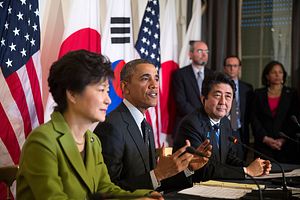When the U.S., Japan, and South Korea concluded a memorandum of understanding (MOU) to expand trilateral defense cooperation through an intelligence sharing agreement last December, it was heralded as a stride in the right direction. It was a “good first step,” to use the exact words of David Shear, Assistant Secretary of Defense for Asia and Pacific Security Affairs, who spoke last Friday at an event hosted by the Center for Strategic and International Studies (CSIS).
At the same time, Shear also expressed hopes that such cooperation would continue beyond the trilateral information sharing agreement, commenting that opportunities for further such arrangements should be explored. But Shear also conceded the need to be “realistic and patient in how we approach this, given the sensitivities.”
The MOU allows Tokyo and Seoul to voluntarily share sensitive information on North Korea’s nuclear and missile programs with each other through the United States. However, it is difficult to avoid the perception that this is a stopgap measure in response to the failure of the bilateral General Security of Military Information Agreement (GSOMIA) in summer 2012. As The Hankyoreh reports, since the MOU is limited to threats posed by North Korea, “the agreement is not wholly satisfactory to the U.S., which wants the three countries to share all their military intelligence with each other.”
Public opposition in South Korea to the 2012 GSOMIA, which prevented it from being ratified in the South Korean National Assembly, is often interpreted purely as an anti-Japan phenomenon, but it was also a backlash against the generally secretive nature in which the South Korean government was trying to sign the accord. Though history-related problems make a deal even more difficult now than it was in 2012, politicians across the Tsushima Strait need to make a clear, convincing, and public argument to voters about the need for greater security cooperation.
An editorial in The Korea Herald is already leading the way, arguing that “South Korea needs to depart from walking a tightrope between the U.S. and China, at least over crucial security matters.” The piece continues: “Sitting on the fence under the cover of strategic ambiguity might be inappropriate and even detrimental to deterring Pyongyang’s evolving threats and guaranteeing Seoul’s long-term security interests… From this standpoint, South Korea may find some room to become more flexible in enhancing cooperation with Japan.”
Another positive sign that both sides are slowly gathering the political will to talk to each other is Representative Na Kyung-won’s two-day visit to Japan starting on Wednesday. Na is a member of the ruling Saenuri Party, chairwoman of the parliamentary committee for foreign affairs and unification, and the leader of the South Korea-Japan Parliamentarians’ Union. She is scheduled to meet Japanese government officials and politicians, including Foreign Minister Fumio Kishida; it is expected she will discuss the upcoming Abe Statement commemorating the 70th anniversary of Japan’s defeat in WWII.
The U.S. encourages and welcomes greater security cooperation between Japan and South Korea because it will allow for greater contingency planning and hence a more effective deterrence strategy against North Korean and Chinese provocations. Slowly but surely, Washington’s determination to deal with Japan and South Korea in the security realm — without reference to historical problems — appears to be having an effect on increasing greater cooperation between Tokyo and Seoul.
































